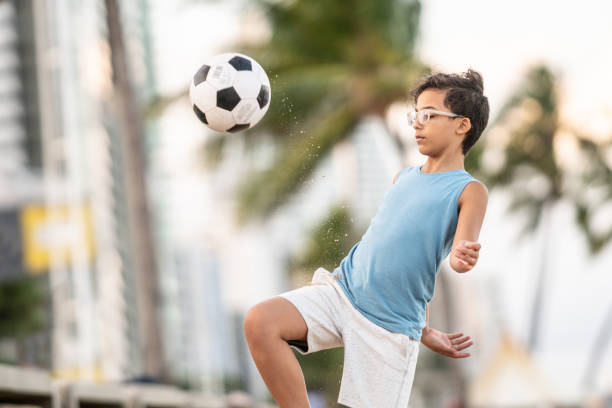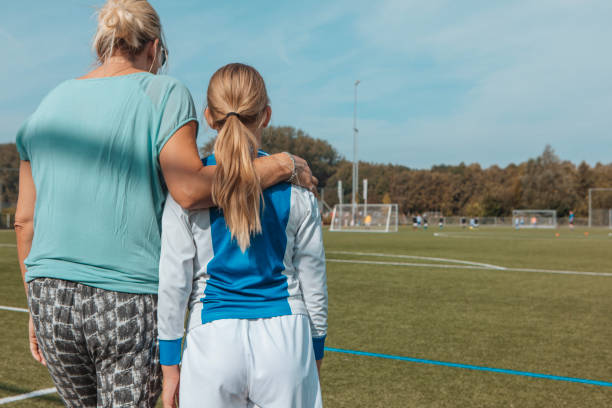Soccer is a game where one needs to have very keen eyesight. Whether you are tracking a flying ball, observing what your opponent is likely to do, or aiming for that perfect shot at the goal, your eyes will be your most valuable assets out on the field.
What if you wear glasses? Can you still play soccer without compromising your performance-or worse, risking injury?
The simple answer is yes, you can. Now, the long explanation? That is where it gets a little fascinating.
Why Vision Matters in Soccer
Soccer is a dynamic, fast-paced sport that needs split-second decision-making. You need to be able to see the ball, judge distances accurately, and read the movements of other players.
Poor vision may lead to missed passes, mistimed tackles, or even collisions with other players.
If you’re nearsighted (myopic), farsighted (hyperopic), or have astigmatism, playing without corrective lenses can feel like trying to navigate a maze blindfolded. Everything becomes blurry, and your depth perception takes a hit.
That’s why so many players who need vision correction turn to glasses or contact lenses. But glasses, in particular, come with their own set of challenges on the field.
CHECK OUT | Why Do Soccer Players Wear Shin Guards?
FIFA Rules on Glasses in Soccer
While FIFA’s official Laws of the Game do not ban players from wearing glasses, they do state that any form of worn equipment must not be dangerous to the player or others.
This would imply that traditional everyday glasses, with hard frames and sharp edges, could be ruled unsafe.
FIFA Law 4 – The Players’ Equipment: A player shall not use any equipment or wear anything that could endanger him or another player (including any kind of jewelry).
In other words, while eyeglasses aren’t strictly forbidden, the call is left strictly to the judgment of the referee as to whether or not your glasses are safe to wear for any particular contest.
NFHS (High School) and Youth League Rules
The NFHS follows similar rules for high school soccer in the U.S. It allows sports goggles but discourages regular prescription glasses. Most youth leagues are very careful and recommend that players wear protective sports eyewear instead of regular glasses.
Sunday League and Casual Games
If you are playing in some friendly neighborhood match, there are usually no strict rules. Provided you feel comfortable and your glasses are not a risk to others, you can probably play. You do still need to consider safety, though, which we’ll talk about next.
CHECK OUT | Can You Wear Running Shoes for Soccer?
Can You Play Soccer With Glasses?

According to FIFA and its ‘Laws of the Game‘, sports spectacles can be worn, but everyday glasses-that is, reading glasses that you wear at home-cannot.
One of the major concerns of those wearing glasses while playing soccer is injuring themselves and others. Understandably so! Glasses can easily fall off during a game, or even worse, shatter and cut the player.
Glasses may fog up or smear, performance-wise, making it hard to see the ball or other players. It’s very annoying to keep cleaning them on your jersey.
Despite these concerns, many soccer players do choose to wear glasses while playing but they opt for goggle-styled glasses.
The final decision on whether to wear glasses while playing soccer should be left to the player himself, based on his own judgment of safety, comfort, and performance.
What Are The Risks Of Playing Soccer With Regular Glasses
You’re sprinting down the wing, the ball at your feet, and suddenly—your glasses slip down your nose. You try to adjust them mid-run, but it’s too late. The defender tackles you, and your glasses go flying.
Now you’re left squinting at the blurry field, wondering where the ball even went.
Here are some specific risks of playing soccer with regular glasses:
Injuries: Fragile glass lenses will break from a minor shock and, worst still, break and cause injuries through cuts to the eyes, etc. The plastic lenses, although more solid than glass ones, can crack and injure you or even other people nearby.
- Poor Vision: Fog, slip, smear glasses obscure the vision at critical times.
- Disruptions: It might divert you as you’ll always be putting them in or afraid that they may fall out.
- Unfair Advantage: Some players believe that glasses can actually provide an unfair advantage because of weird ball deflections. Rare it might be, but a point nonetheless.
CHECK OUT | Best Stores to Buy Soccer Jerseys in New York
What Are The Best Glasses To Play Soccer?

Not okay with regular glasses-what’s next? Fortunately, a few options have been put in place for such athletes. Let me break them down for you.
1. Sports Goggles
Sports goggles are the most common type of goggles used by soccer players who need any form of vision correction.
These are designed not to slip easily off your face, even with the most aggressive physical contact. They are made from strong polycarbonate material that is both shatterproof and lightweight.
Many models come with anti-fog coatings and UV protection for outdoor play.
When choosing sports goggles, look for:
- A snug but comfortable fit
- Adjustable straps to keep them in place
- Padding around the frame to prevent injury
- Lenses that match your prescription
2. Prescription Sports Glasses
If you like something a bit more similar to regular glasses, then you should consider prescription sports glasses. These are similar to sports goggles but with sleeker designs.
They’re still made from robust materials and often feature anti-slip nose pads, along with wraparound frames to provide better peripheral vision.
3. Contact Lenses
Contact lenses are the ultimate solution that will help a number of players.
They provide clear vision without any headache of frames or straps. Contacts move along with your eyes to give you full field of view and eliminate even the slightest chance of fogging or slipping.
Plus, they’re virtually undetectable, so you don’t have to worry about looking different on the pitch.
However, not everyone finds contacts comfortable or easy to put in and take out. If you are new to contacts, they might be bothersome for a while until you get used to them.
And remember, hygiene is key to avoiding eye infections.
4. LASIK or Other Vision Correction Surgery
If you’re serious about soccer and tired of hassling around with glasses or contacts, you might want to think about vision correction surgery.
Procedures like LASIK can permanently fix your vision to the point of never needing a corrective eyeglass again, of course big decision and this is not the one to go easy on-a very expensive way to recover.
And it also isn’t fitting for everyone but to some gamers, it certainly is a godsend.
CHECK OUT | Do Soccer Goalies Wear Knee Pads? A Complete Guide
Best Way To Play Soccer with Glasses or Goggles
If you’re opting for the sports goggles or prescription glasses route, here’s how you could get the best out of the gear:
- Wear the correct fit: the goggles or glasses should be fitting snugly and not too tight. Look out for adjustable straps and padding in comfort and stability.
- Test Them Out: Before hitting the pitch, wear your new eyewear during practice sessions to get used to how they feel and perform.
- Keep Them Clean: Smudges and dirt can impair your vision. Carry a microfiber cloth to clean your lenses as needed.
- Communicate with Your Team: Let your teammates and coach know you’re wearing glasses or goggles. This can help avoid misunderstandings during play.
- Have a Backup Plan: Things sometimes tend to go out of order. Always have a spare pair of glasses or contacts in your bag.
Psychological Aspect Of Wearing Glasses To Play Soccer
It’s also very important not to neglect the mental side. First times wearing glasses or goggles may feel weird if you’re not used to them; you may think that you look funny or that they will impede your play.
If you’re constantly doubting yourself, you’re going to bring that out in your game.
The best way to deal with this is to think of your eyewear as part of your equipment. Consider it as a shin guard or your cleats-this is just another gadget that will make you play to the best of your ability, and you will eventually forget you’re wearing them.
CHECK OUT | Do Soccer Players Wear Mouthguards? Benefits, Risks, and Expert Advice
Can Referees and Coaches Wear Glasses?

Of course, not only players should have good visibility on the pitch; referees and coaches also make huge decisions that rely on vision.
Many referees wear sports glasses or contacts for a reason: so they do not miss that call. Coaches wear glasses, too, as it is a huge task to keep track of your team or players in thick action.
If you’re in one of these roles, the same principles apply: prioritize safety, comfort, and clarity. After all, your vision is just as important as the players’.



